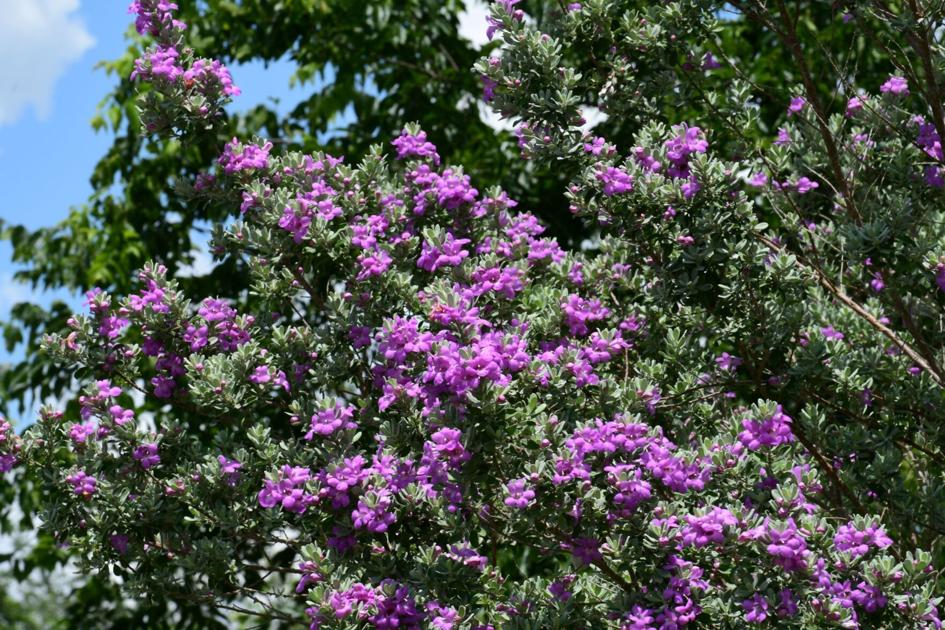Land of gardeners: surviving the summer heat | House and garden
Summers can be brutal for Victoria gardens and gardeners. It’s easy to fall into survival mode while struggling to keep our beloved plants from succumbing to the heat and frequent drought. Here are a few tips.
Lawns suffer during the summer heat. To alleviate this stress, start by raising the lawn mower blade to the maximum recommended for your variety of sod. For example, for St. Augustine grass, raise the blade four inches. This type of mowing helps the grass to develop deeper roots, fewer weeds, and denser turf that requires less water. Deep watering early in the morning is recommended.
A great online resource published by Texas A&M AgriLife Extension, Lawn Care Tips for Summer, will help you keep your lawn in top condition. The information covers watering, mowing, insects, diseases, fertilization and weeding.
Choose plants resistant to drought and heat. Much of the stress of gardening can be taken away by choosing plants that are heat and drought tolerant. Most of these plants are Texas Super Stars. Once established, irrigation can be minimized.
It is amazing that these heat lovers also tolerate our winters. A few of them may have to regrow from the roots in the spring.
The evergreen erect wisteria withstands the Victoria heat. He handled the “Big Freeze” just as well. This one was lush and flowery at the end of May. He will need a strong trellis.
A drip irrigation system for flowers and ornamental plants saves water and reduces fungus and disease problems compared to aerial watering. It is necessary to monitor this system.
Organic mulch helps maintain humidity and protects from the scorching sun.
Monitor the plants all summer. This means you have to get up close to examine the plants for insects and disease. Detecting problems early allows for less toxic solutions.
Snails can quickly decimate your favorite plants. The snails have an appetite for the angel’s trumpet and daylilies in my garden. Solutions include picking up the snails by hand and destroying them or using diatomaceous earth or pesticide baits. If you choose pesticides, check the toxicity levels and follow the directions on the label. The bait should be evenly dispersed.
Grasshoppers can be serious pests in gardens. The best defense is to keep the areas mowed. Watch for grasshoppers before summer begins and begin treatment with appropriately labeled insecticides as soon as you find babies (1/2 inch). When these “babies” become adults, therapeutic remedies are slim.
Compare the products for the level of toxicity. Follow label directions, especially on-site application restrictions, such as areas with fruits and vegetables.
Mosquitoes are not only annoying pests, but pose serious health risks to the gardener. Eliminate their breeding grounds – standing water. Empty and clean birdbaths and pet waterers regularly. Bacillus thuringiensis israelensis (BTI) can be added to standing water, containers, bodies of water and rain barrels to kill mosquito larvae, provided the water is not used for human consumption. If used according to label directions, it is not expected to harm fish, birds or pets.

Texas superstar Pride-of-Barbados loves the heat. Depending on winter temperatures, they may have to regrow from the roots in the spring.
Keeping the garden clean is a chore for all seasons. Clean yards and gardens reduce disease and pests. Remove dead, diseased, or severely infested parts of plants or the entire plant. Keep the floor free of debris.
Removing weeds reduces competition for moisture and nutrients and minimizes insect breeding grounds. Avoid opportunities for weeds and grass burrs to go to seed.
Last but not least, take care of the gardener. Beware of poisonous snakes and stinging or biting insects. Stay hydrated. Protect your skin from the sun’s harmful rays by wearing a hat, protective clothing, and sunscreen. Work in the cooler parts of the day and know when it’s time to take a break.
The Gardeners’ Dirt is written by members of the Victoria County Master Gardener Association, an educational organization of Texas A&M AgriLife Extension – Victoria County. Send your questions to the Attorney at Law, PO Box 1518, Victoria, TX 77901; or [email protected], or comment on this column on VictoriaAdvocate.com.

